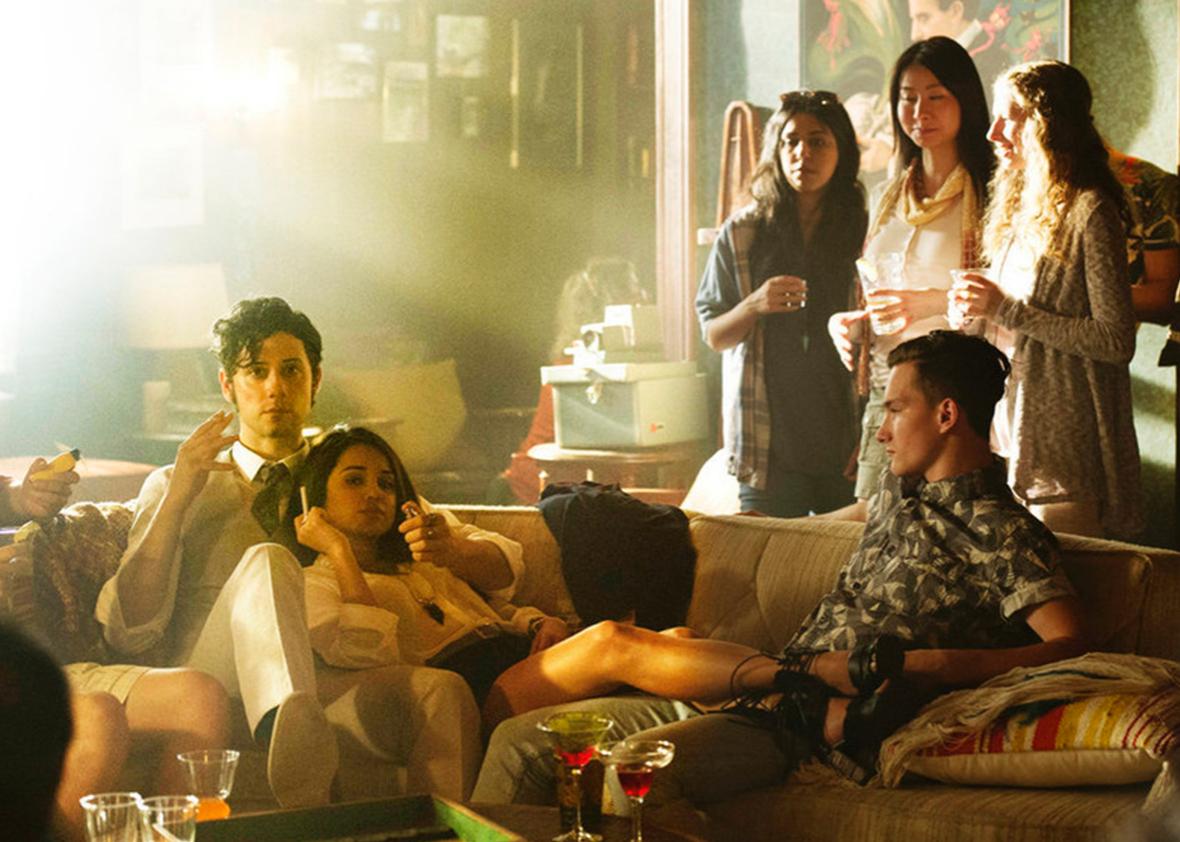The new Syfy series The Magicians, based on Lev Grossman’s trilogy of novels, wants you to know right off the bat that it isn’t Harry Potter. That’s why in the pilot we see two characters meet in a classroom, and the show quickly cuts to an athletic bout of levitation sex: There’s the usual grinding and moaning, but because both participants are magic, you see, they also float several feet above the bed. Even the Slytherins would be scandalized by this.
Television loves to bring you the gritty, sexed-up version of not-inherently-sexy subcultures. Sex, drugs, and hospitals? That’s Grey’s Anatomy. Sex, drugs, and classical music? Mozart in the Jungle. So now we have sex, drugs, and magic: The Magicians.
The only thing is, in the above scene, the female half of this pair is wearing a bra during the act, and the couple’s midsections are covered by a well-placed blanket. That’s basic cable for you. Because as much as The Magicians wants to outsex Harry Potter, it can’t match Game of Thrones in either production value or sheer titillation. And so the show is at its worst when straining to be provocative and, in so doing, incorporating various Hollywood clichés (Hogwarts meets Gossip Girl, one review blared). But in terms of establishing a world and getting the plot going, the show’s first episodes are actually pretty promising.
In the series, which premieres Monday night, recent college graduate Quentin Coldwater is aimless and depressed and still obsessed with the Narnia-like book series he loved as a kid. (He can’t even have fun at a debaucherous party where MGMT’s “Time to Pretend” plays, which I’m choosing to believe is not a cliché but a very specific period reference to 2008–09, the latter year being when Grossman’s first book was released.) After a curious alumni grad school interview—or rather, not-interview, because his interviewer is keeled over in the corner when he arrives—he is suddenly spirited away to a graduate entrance exam for magicians. He passes, which earns him entree into a fantastical world he hadn’t known existed and also neatly solves the question of whether he has any talent or purpose in life: Yes, he does, and it’s magic!
At Brakebills, Quentin’s magic graduate school, he meets Hermione-minus-even-an-ounce-of-chill Alice; Kady and Penny, the aforementioned floating fornicators; and Eliot and Margo, jaded upperclassmen who show Quentin the ropes in a social hierarchy that could be right out of Clueless or Mean Girls, except instead of popular kids and band nerds, there are illusionists and healers. Some of the show’s characterizations fall victim to similar failures of originality: For instance, Eliot is gay so he is given “interesting” hair and clothes. But hopefully these broad strokes will fall away as the show finds its footing—the books, after all, treat their protagonists as full-fledged humans rather than types.
In dream sequences and mysterious coincidences, viewers learn that Fillory, the not-Narnia land of the not-Narnia books Quentin tries to not-obsess about, may indeed be not-fake. Here I started wishing the show had an HBO-style budget, so the overgrown forests standing in for Fillory and its environs could get some sprucing up. And when we meet the Chatwins, the siblings whom the Fillory books are based around, I had the nagging feeling the TV show cut the novels’ five children down to three because it simply couldn’t afford two more kids. But some effects are better than others: The first episode culminates in the introduction of “the beast”—a creepy version of a Magritte painting, a suited man whose face is obscured not by a pear but by hundreds of moths. It’s a great scene from the books to which the show’s creators do justice.
In other changes from page to screen, the show follows Quentin’s friend Julia’s story in addition to Quentin’s. Readers don’t find out what was going on with Julia during Quentin’s Brakebills years until the second book, The Magician King, but here we see that Julia, who tested for but didn’t get into Brakebills, joins up with a group of underground, self-educated magicians to earn her stripes. Though the actress who plays Julia suffers from the tyranny of the mermaid blowout, this change is a good one, giving us some relief from Quentin’s story and a wider view of the show’s universe.
My hope is that, despite its basic-cable raciness and teen-movie moments, the show is ultimately able to recreate what really made me love the novels to begin with: the characters’ friendships, the way Brakebills and Fillory provide both self-aware meta-fantasy commentary and mysterious worlds of their own, and, most of all, how they addressed the “now what?” quality of young adulthood. There were encouraging moments in the first episodes, like when Quentin asked the school’s dean why his alumni interviewer died and the dean explained that man had “snuck a box of Oreos.” “Magicians can’t have Oreos?” Quentin asked. “Diabetics can’t have Oreos,” the dean responded, in effect explaining that magicians are people, too.
But I wondered what it meant, then, that the dean asked Quentin to stop taking his antidepressants when he got to Brakebills. Aren’t magicians just as likely as normal twentysomethings to get depressed? Magic is cool and all, but there’s no spell to fix a serotonin imbalance. I’m interested to see if the show addresses this and, in keeping with television’s larger trend toward depicting mental illness, deals, or doesn’t, with Quentin’s depression. I want The Magicians to show us a bit less magic sex and a bit more of this: magical powers as a metaphor for dealing with real, complicated life.
